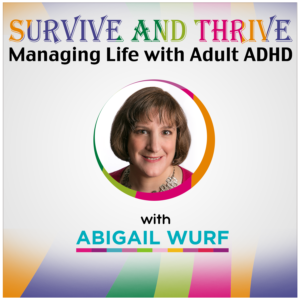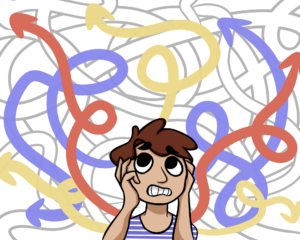 Find past episodes of the show below and be sure to subscribe on iTunes so you never miss an episode.
Find past episodes of the show below and be sure to subscribe on iTunes so you never miss an episode.
Multi-Tasking May Mean Multi-Failing
 Multi-tasking is trying to do many different things at one time. In reality few people can truly multi-task with the intended result of saving time while not affecting the quality of their work. Scientific research reveals that the mind is limited by how many things it can juggle at the same time. There are a few exceptional people who are able to juggle more than the average person and we all think we are a part of that group. Statistically that is hardly likely.
When the average person is multi-tasking some level of quality suffers. Maybe not on all the things they are trying to do at once but often at least something gets less than the attention it deserves. This usually results in a mistake or two. What your tasks are will affect the level of disaster that results from the mistake(s).
Another risk of multi-tasking is that while trying to do multiple things at one time you may end up not getting any one of the things done on time. On the other hand, doing one task at a time you are likely to enjoy some level of accomplishment of task(s).
There is a caveat. If you are going to do one thing at a time you need to decide in advance how long you are going to work on that task. The common answer, especially from my ADHD affected clients is “as long as it takes to finish the task.” That is the wrong answer. You decide ahead of time how long you are going to spend on the task. You do this by figuring out the value of the task in the scheme of things or the value of the task to the person who assigned you the task if that is the case. Based on that information you determine how much time you are going to spend on the task.
For example: Writing a memo to the CEO of the company for your boss versus writing an internal memo to the staff about keeping the staff kitchen clean are different value tasks. You should not spend the same amount of time for each memo. The memo to your CEO demands more time and attention than the kitchen cleaning memo because of the value difference.
Once you start thinking in time ratio value of tasks you will begin to understand that there is no reason to multi-task and have quality suffer. You are first judging the quality necessary for each task by rationing time for each task based on its value in the greater scheme of things.
Don’t get caught in multi-failing by trying to do everything at once, all to the same standard. Give each task the time and quality that is appropriate for its value.
Multi-tasking is trying to do many different things at one time. In reality few people can truly multi-task with the intended result of saving time while not affecting the quality of their work. Scientific research reveals that the mind is limited by how many things it can juggle at the same time. There are a few exceptional people who are able to juggle more than the average person and we all think we are a part of that group. Statistically that is hardly likely.
When the average person is multi-tasking some level of quality suffers. Maybe not on all the things they are trying to do at once but often at least something gets less than the attention it deserves. This usually results in a mistake or two. What your tasks are will affect the level of disaster that results from the mistake(s).
Another risk of multi-tasking is that while trying to do multiple things at one time you may end up not getting any one of the things done on time. On the other hand, doing one task at a time you are likely to enjoy some level of accomplishment of task(s).
There is a caveat. If you are going to do one thing at a time you need to decide in advance how long you are going to work on that task. The common answer, especially from my ADHD affected clients is “as long as it takes to finish the task.” That is the wrong answer. You decide ahead of time how long you are going to spend on the task. You do this by figuring out the value of the task in the scheme of things or the value of the task to the person who assigned you the task if that is the case. Based on that information you determine how much time you are going to spend on the task.
For example: Writing a memo to the CEO of the company for your boss versus writing an internal memo to the staff about keeping the staff kitchen clean are different value tasks. You should not spend the same amount of time for each memo. The memo to your CEO demands more time and attention than the kitchen cleaning memo because of the value difference.
Once you start thinking in time ratio value of tasks you will begin to understand that there is no reason to multi-task and have quality suffer. You are first judging the quality necessary for each task by rationing time for each task based on its value in the greater scheme of things.
Don’t get caught in multi-failing by trying to do everything at once, all to the same standard. Give each task the time and quality that is appropriate for its value.Embrace the Good…Again
 It is easy to get pessimistic about the world today and about our own lives.
It is easy to get pessimistic about the world today and about our own lives.
I used to be an incredibly pessimistic person myself. This is understandable as I suffered depression from a very early age, had anger issues and was generally out of control. My mode of operation even into adulthood was to make choices not based on opportunities but on least regret. In other words, my choices were based on what I thought I would least regret doing. The assumption being that there would always be some regret no matter what you did.
There were some good reasons for my negativity. Some not so fun things happened in my life as I was growing up such as my father dying when I was 13 and my last grandparent dying by the time I was 17. Here is the thing though, many others have the similar experiences and many much worse. As an adult, the worst thing that happened to me was waking up from back surgery at age 30 and not only being in more pain than I was prior to surgery which was significant but also losing my ability to dance after a lifetime of dancing. Not only was it my profession that I had been doing it since I was a child, it had been my one solace. The only time I felt free was when I was dancing, especially when I was creating dances.
My 30s were a dark time in my life. Following the surgery, I had two follow up surgeries, was rear-ended by a car and broke my back. I was extremely depressed and unsure what to do with my life.
One day though, everything shifted. I was working at home at the computer and it suddenly occurred to me that I was managing despite the chronic pain, ADHD, depression, etc. I was getting up each day and showing up in life. Not bad. Then I thought, actually it was impressive that I just kept going regardless of the bad stuff. All my experiences had made me strong and scrappy.
The world shifted for me. I could live embracing the bad or I could live embracing the good. It was entirely up to me. Embracing the bad had not got me very far in certain areas of my life. What could it hurt to embrace the good for once?
I concluded that everybody has at least one something if not more that is painful or difficult or stifling in their lives. I was not so different and there was simply no reason I couldn’t shift my focus from the bad to the good. All it cost me was saying goodbye to dwelling in negativity that had become comfortable and known. It meant having new experiences some good, some bad but regardless I didn’t have to be pulled down by the bad.
This isn’t denial. It is simply deciding to embrace what is succeeding no matter how small. Now I can hear some of my clients saying what if there is no success. Look for it. On paper physically I am not a success, I have been in chronic pain for almost twenty years now but instead I choose to think about how I have managed to reinvent myself and created a life that is by no means perfect but I am still here. I get through each day and to me that is pretty damn successful.
What are you not embracing about yourself? I have yet to meet a client that I couldn’t find something good to embrace about them. An exercise I think is great to do is to write your biography and then look at it clinically. It is not all about what bad has happened or what failures might of occurred. Are you still standing? Are you still getting up each day and facing it? That is success. Embrace it.
Important note: If you are suffering from depression, get help. I didn’t get better all by myself. I created a support system of doctors who played important roles in helping me live a better life.
Negative Thoughts are Dangerous, Here’s What to Do to Be Safe
 Negativity can be dangerous. When we are thinking, we are building neuro-pathways in our brain. The more often you think a negative thought, the more likely you will think more negative thoughts. It is as if you are building a habit in your brain – something happens and the go-to emotion is negative unless it is a clearly positive happening.
Negativity can be dangerous. When we are thinking, we are building neuro-pathways in our brain. The more often you think a negative thought, the more likely you will think more negative thoughts. It is as if you are building a habit in your brain – something happens and the go-to emotion is negative unless it is a clearly positive happening.
There are other options when something happens that isn’t necessarily positive. One way to stop developing the negative pathways in your brain is to respond constructively to situations. This means thoughts like:
- What am I learning from what is happening?
- What are my response options?
- Can I redirect my go-to negative reaction to, if not positive, at least neutral?
You can also shift your thinking by changing the thought, “Why is this happening to me? To “Why is this happening for me?” Although on the surface it seems a subtle change, in reality it is a huge paradigm shift.
When you think of something happening to you it is more of a victim mentality. If you think something is happening for you, it causes you to reflect.
- What is happening?
- What is a constructive message I can construe from the event?
- Is what is going on useful to me and if so, how?
- An open and curious mind when facing potentially negative events gives you the upper-hand. No event is a waste, all events have a possibility of learning within them.
So don’t keep re-enforcing negative pathways in your brain. Pause a moment and ask yourself some questions to see what you can pull from each event that may appear negative at the onset. Be constructive with your experiences no matter the immediate perceived value, negative or positive, and find a way to react that moves you forward and wiser.
Letting Other’s Define What is the “Right” Way to Do Things
 Many people affected by ADHD and/or overwhelm often look to others as to how to do certain things the “right” way. We don’t trust our instincts as to how to do something the “correct” way.
Many people affected by ADHD and/or overwhelm often look to others as to how to do certain things the “right” way. We don’t trust our instincts as to how to do something the “correct” way.
The thing is, rarely is there just one “correct” way to do something. There may be more expedient ways or more beautiful ways of doing something but unless that is part of the project it doesn’t really matter how you do something as long as you get it done.
So often when coaching clients, I find myself in conversations about there concerns that they are not doing things the “right” way or that they can’t get started on something because they don’t know the “right” way to get started.
My question is always, “Do you know someway or anyway to get started?” If the answer is “yes” then I encourage them to just start and forget this perceived notion of “correct” ways. Often I encounter resistance because they are still caught up in the idea of the “right” way.
If the “right” way is so important, get the project done anyway you can and then find out the “right” way for the future but after the pending project is done.
An example is a workshop I presented a while ago. I thought I had to start from scratch to create the workshop the “right” way. Make each section, while a different topic, set up the exact same way.
First off, since I had worked with much of the material before, starting from scratch was a waste of time. Secondly, who said each section had to be designed the same way? Me. Well that is ridiculous, each section should be designed based on how best to deliver the material.
Most importantly I was making the assumption that many of us make that other people’s ways had to be superior to my way. This assumption is chronically made by people affected by ADHD when it comes to activities and tasks that are extremely structural in nature despite the fact that our way is just as good a way. In fact in some cases even better because it is the way that works best for us.
This is summed up by one of my favorite quotes:
If you can’t fly then run,
if you can’t run then walk,
if you can’t walk then crawl,
but whatever you do
you have to keep moving forward.
–Martin Luther King, Jr.
Common Co-Morbidities Associated with ADHD

Co-morbidities are additional pathologies that may affect those with ADHD. The most common are in order of prevalence:
- Anxiety
- Depression
- Oppositional Disorders
- Substance Abuse
- Bipolar Disorder
- Tics
What is important to keep in mind is that just because you have ADHD doesn’t mean you will have any of these issues but the possibilities are greatly increased when affected by ADHD.
Also important, if you are struggling with any of these issues or suspect you might be able to get help. You don’t have to suffer needlessly. I am not saying that it is easy to solve any of these issues but there is treatment to either stop the symptoms or make them more manageable.
If you are being treated for ADHD some of the issues you might be having could be more related to the co-morbidity than the actual ADHD. I know it feels like one more thing to have to get checked out, deal with and seek help on but it can make the quality of your life so much better.
I struggled for many years with depression and anxiety. Whether it was because of the ADHD or not, getting help really made a difference in the quality of my life and the quality of life of those around me. Our struggles affect not just ourselves but those around us who care.
Part of the manifestation of my anxiety was compulsive talking. I am still a highly verbal person but the compulsion is no longer always trying to fight it’s way out from inside me. It is been such a difference that my brother thought I was mad at him for a while once things got better. He thought this because he interpreted my less talkativeness as me deliberately giving him the silent treatment.
So your co-morbidities don’t just affect you but those around you. If you are not motivated to seek help to make your quality of life better maybe think about doing it to make the quality of life better for those who surround you in life.
How to Deflect Uncomfortable Questions When You Have ADHD
 During the holidays many of us see our family and maybe even go back to our old neighborhood and see people we knew growing up. This can be good or bad. Being affected by ADHD often means our growing up years were hard, especially if we did not know at the time that we were affected by ADHD.
During the holidays many of us see our family and maybe even go back to our old neighborhood and see people we knew growing up. This can be good or bad. Being affected by ADHD often means our growing up years were hard, especially if we did not know at the time that we were affected by ADHD.
Our reputations may not have been stellar and we may not have felt stellar about ourselves back then! I have had clients ask how to manage going back home and/or seeing family over the holidays. One of the concerns is that they are afraid they might regress to old behaviors or be treated as they were when they were maybe not as together as they are now. Or, maybe, their life hasn’t turned out the way they expected or is currently in a slump and worried about how to respond to people’s questions.
I have got one word for you – DEFLECT. That is right, DEFLECT. You don’t have to answer anything you don’t want to nor explain anything you don’t want to. People affected by ADHD often explain too much, actually over explain because they are worried about being understood and seen as they wish to be seen. This is a virtually impossible task.
In addition, when we get around people from our past we can tend to regress to past behaviors that we have worked hard on getting rid of as adults. When we find ourselves doing this, we feel a sense of failure. We want people to see all the progress we have made.
Or, we may not be where we want to be currently in our life and feel uncomfortable about letting that be known. We are worried how we will be perceived.
Let go of those worries right now. Learn to deflect. I didn’t work for over ten years and had health problems neither of which I really wanted to talk about. I felt like a failure. I also felt like I had to answer every question and inquiry put my way with an in depth response but I learned otherwise.
The formula is DEFLECT = NEBULOUS REHEARSED LINE + QUESTION
Examples:
Them: “Abigail, are you working yet?”
Me: “Things are starting to happen, but I really want to ask you about how your kids are doing?”
—
Them: “Abigail, what pain medications are you taking because you have to be careful. I’ve hear that some of those medications are addictive and you may already be addicted and not know…”
Me: “Whoa, no worries, I am getting great and careful treatment. Enough of this medical talk, I been thinking of catching a movie this weekend, have you seen any recently? Have any suggestions?”
I would practice some deflection comments based on whom I thought I might see before an event. I created an arsenal of deflecting comments and questions ready to be deployed at a moments notice for most any situations. Being situated thus much of the stress of socializing eased for me.
Pick someone in your life who you feel is a real natural at the social graces and work with them to create your own arsenal of deflecting comments and redirection questions to prepare you for the holidays social events or any other social event you are concerned about.
